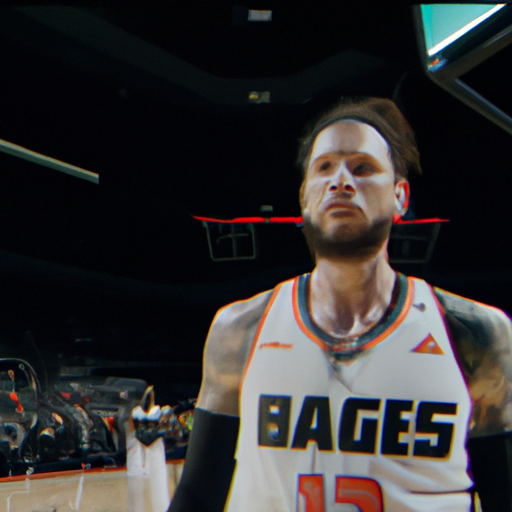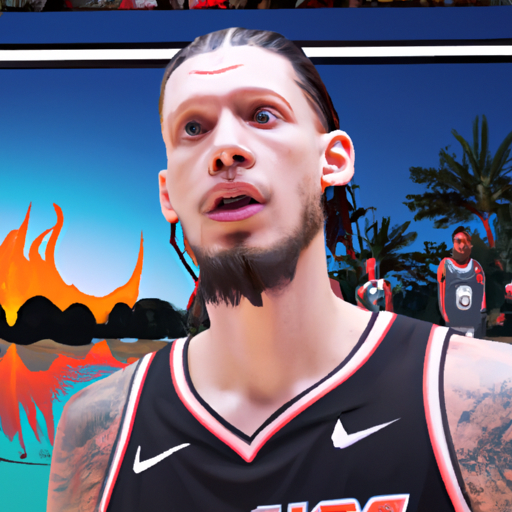Michael Beasley on Miami Heat: “When I was a player, I didn’t like them at all”

Michael Beasley’s Impact on the Miami Heat: A Closer Look
Michael Beasley, a former player for the Miami Heat, recently made headlines with his candid remarks about his time with the team. In an interview, Beasley admitted that during his tenure as a player, he didn’t like the Miami Heat at all. This revelation has sparked curiosity among fans and analysts, prompting a closer look at Beasley’s impact on the team during his time in Miami.
Beasley, a highly touted prospect, was selected as the second overall pick in the 2008 NBA Draft by the Miami Heat. With high expectations placed upon him, he was seen as a potential star who could help lead the team to success. However, his time with the Heat was marked by inconsistency and off-court issues, which ultimately led to his departure from the team.
One of the main factors contributing to Beasley’s rocky relationship with the Heat was his inability to live up to the lofty expectations set for him. Despite showing flashes of brilliance on the court, Beasley struggled to find consistency in his game. This inconsistency, coupled with off-court issues, including legal troubles and concerns about his work ethic, created a strained relationship between Beasley and the organization.
Furthermore, Beasley’s playing style didn’t always align with the Heat’s culture and system. Known for their emphasis on discipline, hard work, and team-oriented play, the Heat had a specific vision for their team. Beasley’s more individualistic approach to the game clashed with this philosophy, leading to friction within the organization.
Despite these challenges, Beasley did have some positive moments during his time with the Heat. He showed flashes of his scoring ability and versatility, demonstrating his potential as a valuable asset to the team. However, these moments were often overshadowed by his off-court issues and inconsistent play, which ultimately led to his departure from Miami.
In retrospect, Beasley’s comments about not liking the Heat as a player can be seen as a reflection of the difficulties he faced during his time with the team. It is not uncommon for players to have mixed feelings about their former teams, especially when their tenure was marked by challenges and unfulfilled expectations.
Since leaving the Heat, Beasley has had a journeyman career in the NBA, playing for several teams and struggling to find a stable role. While he has shown flashes of his talent, he has yet to fully live up to the potential that many saw in him during his early years in the league.
In conclusion, Michael Beasley’s impact on the Miami Heat was a complex one. While he had moments of brilliance and potential, his inconsistent play, off-court issues, and clash with the team’s culture ultimately led to a strained relationship. Beasley’s recent comments about not liking the Heat as a player shed light on the challenges he faced during his time in Miami. As he continues his career in the NBA, it remains to be seen if Beasley will ever fully realize the potential that once made him such an intriguing prospect.
Exploring Michael Beasley’s Journey with the Miami Heat

Michael Beasley, a former NBA player, recently made headlines with his candid remarks about his time with the Miami Heat. In an interview, Beasley admitted that during his tenure with the team, he didn’t particularly like them. This revelation has sparked curiosity among fans and analysts, prompting a closer examination of Beasley’s journey with the Miami Heat.
Beasley’s relationship with the Heat began in 2008 when he was selected as the second overall pick in the NBA Draft. With high expectations placed upon him, Beasley was seen as a potential star who could contribute significantly to the team’s success. However, his time in Miami was marred by inconsistency and off-court issues, which ultimately led to his departure from the team.
One of the main factors contributing to Beasley’s discontent with the Heat was his lack of playing time. As a young player eager to prove himself, Beasley felt frustrated by the limited opportunities he was given on the court. This lack of trust from the coaching staff and his teammates affected his confidence and hindered his development as a player.
Furthermore, Beasley’s off-court behavior also played a significant role in his strained relationship with the Heat. He faced multiple legal issues during his time in Miami, including a marijuana possession charge. These incidents not only tarnished his reputation but also raised concerns about his commitment to the team and his overall professionalism.
Despite these challenges, Beasley did have some memorable moments with the Heat. He showed flashes of his potential, displaying his scoring ability and versatility on the court. However, these glimpses of brilliance were often overshadowed by his inconsistent performances and off-court distractions.
After two seasons with the Heat, Beasley was traded to the Minnesota Timberwolves in 2010. This move marked the end of his first stint with the team, but it was not the end of his association with Miami. Beasley returned to the Heat for a second stint in 2013, hoping for a fresh start and a chance to redeem himself.
During his second tenure with the Heat, Beasley’s role was significantly reduced. He became a bench player, providing occasional scoring bursts off the bench but never fully living up to the expectations set for him. Despite his diminished role, Beasley expressed gratitude for the opportunity to return to Miami and acknowledged the growth he experienced during his time away from the team.
Now retired from professional basketball, Beasley’s candid remarks about his time with the Heat shed light on the complexities of his journey. While he may not have liked the team during his playing days, it is evident that his experiences with the Heat played a crucial role in shaping his career and personal growth.
In retrospect, Beasley’s time with the Miami Heat serves as a cautionary tale for young players entering the league. It highlights the importance of professionalism, consistency, and personal accountability in achieving success in the NBA. Despite the challenges he faced, Beasley’s journey with the Heat ultimately contributed to his growth as a player and as an individual.
Reflecting on Michael Beasley’s Perspective on his Time with the Miami Heat
Reflecting on Michael Beasley’s Perspective on his Time with the Miami Heat
Michael Beasley, a former NBA player, recently opened up about his time with the Miami Heat, revealing that he didn’t have the best experience with the team. In a candid interview, Beasley admitted that during his tenure with the Heat, he didn’t like the organization at all. This revelation has sparked a discussion about the dynamics between players and teams, shedding light on the challenges that can arise in professional sports.
Beasley, who was drafted by the Heat in 2008 as the second overall pick, had high expectations placed upon him. However, his time in Miami was marred by off-court issues and inconsistent performances on the court. This led to a strained relationship between Beasley and the organization, ultimately resulting in his departure from the team.
One of the factors that contributed to Beasley’s negative perception of the Heat was the pressure he felt as a young player. Being a high draft pick comes with immense expectations, and Beasley struggled to live up to them. The constant scrutiny and criticism took a toll on his confidence and affected his performance. This, in turn, strained his relationship with the team and created a hostile environment.
Another aspect that Beasley highlighted was the lack of support he received from the organization during his struggles. He felt that the team didn’t provide him with the necessary guidance and resources to overcome his off-court issues. This lack of support further exacerbated his negative feelings towards the Heat.
Furthermore, Beasley’s perspective on the Heat may have been influenced by the team’s decision to trade him. In 2010, Beasley was traded to the Minnesota Timberwolves, which marked the end of his first stint with the Heat. This trade could have been seen as a lack of faith in Beasley’s abilities, further fueling his resentment towards the organization.
It is important to note that Beasley’s perspective is subjective and based on his personal experiences. Every player’s journey is unique, and their perception of a team can be influenced by a multitude of factors. While Beasley may have had a negative experience with the Heat, it doesn’t necessarily reflect the overall culture or environment of the organization.
Reflecting on Beasley’s perspective, it is crucial to acknowledge the challenges that players face in professional sports. The pressure to perform, the constant scrutiny, and the lack of support can all contribute to a strained relationship between players and teams. It is essential for organizations to provide a nurturing and supportive environment for their players, ensuring their well-being both on and off the court.
In conclusion, Michael Beasley’s recent revelation about his time with the Miami Heat sheds light on the challenges that can arise in professional sports. His negative perception of the organization was influenced by the pressure he felt as a young player, the lack of support he received, and the team’s decision to trade him. However, it is important to remember that every player’s experience is unique, and their perspective may not reflect the overall culture of the organization. This discussion serves as a reminder of the importance of creating a supportive environment for players, fostering their growth and well-being.

